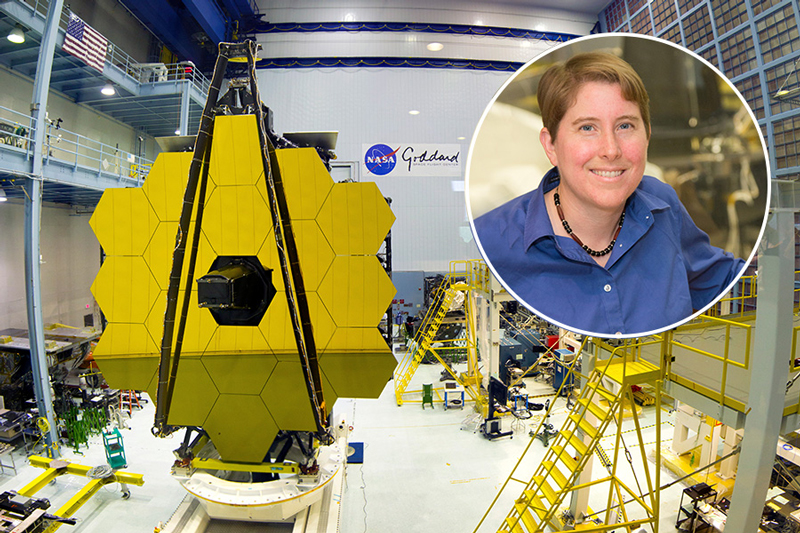


NASA scientist with Delaware roots
Photo by Evan Krape September 25, 2017
Jane Rigby, who grew up in Seaford, to present Vernon Lecture
Astronomy, NASA, astronauts and “what’s out there?” They all intrigued Jane Rigby as a youngster growing up in Seaford, Delaware. That fascination had such an immense gravitational pull on Rigby that she became an astrophysicist—and now is a key player on NASA’s project team for the James Webb Space Telescope. Astronomers say this tool, so large that it will have to be folded up to be launched into space in spring 2019, will revolutionize our view of the universe.
As deputy project scientist, Rigby will share an insider’s view of the James Webb Space Telescope at the Harcourt C. “Ace” Vernon lecture on Tuesday, Oct. 3, at the University of Delaware’s Clayton Hall Conference Center. The lecture, which is free and open to the public, begins at 7:30 p.m. Please register at this webpage to ensure seating.
NASA’s Goddard Space Flight Center, where Rigby is based, has one of the largest concentrations of space scientists and engineers in the world. They operate the Hubble Space Telescope, more than 50 spacecraft and several major Earth-observing satellites, and also build robots for space exploration.
But they’ve never built an instrument quite like this one before. It’s the first telescope being put into space that’s bigger than a rocket. Because it’s as tall as a three-story building and has a mirror 21 feet across, it will have to be folded like a transformer or a work of origami for launch into space and then it has to unfold correctly once there. A sunshield the size of a tennis court will protect it from the sun’s heat.
“That’s why some of the smartest engineers in the world have been working on this,” Rigby says.
Rigby works on the science team at NASA Goddard led by Nobel Laureate John Mather. Their role is to provide expert scientific advice to the Webb telescope mission, which is a multinational effort involving researchers from Europe, Canada and the U.S.
“The telescope needs to be able to do the science we want it to do,” Rigby says, underscoring the deep collaboration between scientists and engineers during building and testing to ensure the science goals will be met.
The science goals will include exploring how galaxies have evolved over cosmic time, illuminating how stars are formed and how supermassive black holes grow, and looking for life elsewhere in the cosmos, of course. With the ability to see a penny 24 miles away, it will send images with incredible sharpness back to Earth.
The telescope will have an extensive portfolio of projects, perhaps looking at Pluto one day, and at baby galaxies the next. NASA Goddard already has received more than 100 proposals from around the world to use the telescope, which will launch in spring 2019—and that’s just the beginning of the thousands destined to come.
Anyone on Earth can ask to use the Webb, Rigby says. It doesn’t matter who you are or what country or university you’re from. All of the proposals received will be reviewed. Rigby and her colleagues already are preparing for another proposal round next year.
“It’s an exciting time!” Rigby says. “It’s gratifying to be working for a larger community of astronomers, helping them to flesh out the best ideas from as wide a pool as we can and then select the best science to do.”
As an observational astronomer, Rigby says she “loves collecting photons that have traveled billions of years.” She’s also a big advocate for equal opportunities for LGBT people in science and was an organizer of Inclusive Astronomy 2015. She has given numerous public lectures, at venues from the Library of Congress to TEDxMidAtlantic.
The Vernon lecture is sponsored by the Delaware Asteroseismic Research Center, Mount Cuba Astronomical Foundation and Mount Cuba Astronomical Observatory in Greenville, Del.
Harcourt C. (Ace) Vernon (1907–78), after whom the lecture is named, was one of the observatory’s founders and the first chairman of its board of trustees.
Contact Us
Have a UDaily story idea?
Contact us at ocm@udel.edu
Members of the press
Contact us at 302-831-NEWS or visit the Media Relations website

